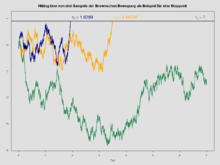08:48
1
Consider the time-homogeneous optimal stopping problem
$$V(x) = \sup_{\tau} E(f(X_\tau^x))$$
where $X^x$ is a diffusion starting at the point $x \in \mathbb{R}$. Typically, optimal stopping problems have an associated optimal stopping time
$$\tau(x) \equiv \inf \{t \ge 0 : X^x_t \in S\}$$
where $...
In mathematics, the theory of optimal stopping or early stopping is concerned with the problem of choosing a time to take a particular action, in order to maximise an expected reward or minimise an expected cost. Optimal stopping problems can be found in areas of statistics, economics, and mathematical finance (related to the pricing of American options). A key example of an optimal stopping problem is the secretary problem. Optimal stopping problems can often be written in the form of a Bellman equation, and are therefore often solved using dynamic programming.
== Definition ==
=== Discrete... ===

In probability theory, in particular in the study of stochastic processes, a stopping time (also Markov time, Markov moment, optional stopping time or optional time) is a specific type of “random time”: a random variable whose value is interpreted as the time at which a given stochastic process exhibits a certain behavior of interest. A stopping time is often defined by a stopping rule, a mechanism for deciding whether to continue or stop a process on the basis of the present position and past events, and which will almost always lead to a decision to stop at some finite time.
Stopping times occur...
« first day (4238 days earlier) ← previous day next day → last day (401 days later) »
